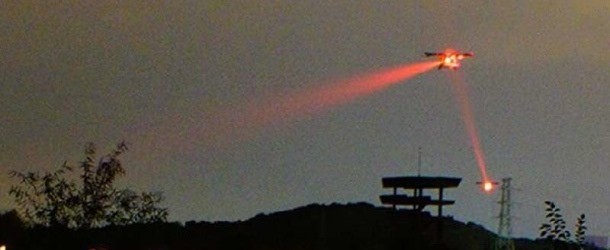Florida Atlantic University, Qubitekk & L3Harris , developing drone-based, mobile quantum network that can maneuver around buildings & withstand inclement weather

(FloridaAtlanticU) Florida Atlantic University’s (FAU) Warner A. Miller, Ph.D., in concert with Qubitekk and L3Harris , is leading the United States’ efforts to deliver the first drone-based, mobile quantum network to seamlessly maneuver around buildings, inclement weather and terrain and quickly adapt to changing environments such as warfare. IQT-News shares the FAU announcement below about the project.
Together with Qubitekk, an award-winning leader in manufacturing entangled photon sources and other hardware for networking quantum processors and sensors, FAU has been entrusted by the U.S. Office of the Secretary of Defense to develop the project.
The network includes a ground station, drones, lasers and fiber optics to share quantum-secured information. Today’s telecommunication networks use fiber optics, connected by laser beams from the ground and between planes and satellites — called fiber and free space optical networks. Drones are used to save lives, secure infrastructure, help the environment and thwart hostile military advances such as the war between Russia and Ukraine.
“The combination of quantum communication and unmanned aerial systems or UAS in this project represents an important advance in the Air Force’s efforts to create fieldable quantum systems for the warfighter,” said A. Matthew Smith, Ph.D., a senior research physicist at the Air Force Research Laboratory (AFRL) Information Directorate. “Additionally, the potential of secure communication from a portable quantum communication UAS in contested environments represents important future capabilities for the Air Force.”
The team is collaborating with the U.S. Air Force to combine expertise from academia, including the University of Illinois Urbana-Champaign, government and industry with the future potential to scale up the project for larger applications with larger aerial platforms, as well as other ground and maritime platforms.
“The contract award represents a new stage in the development of two technologies. For quantum, it’s a major step toward creating hack-proof quantum communication networks that will eventually span the globe, including in space. For drones and UAVs, it’s another milestone in their evolution as the workhorses of the Air Force for a wide range of missions and capabilities,” said Arthur Herman, Ph.D., senior fellow and director of the Quantum Alliance Initiative at Hudson Institute and one of the nation’s foremost quantum experts in defense, energy and technology issues.
Eventually, Miller plans to incorporate quantum memory in the drones so that they can conduct error correction, relay and store information.
“We are just scratching the surface of something that is going to amplify into a lot of different applications,” said Miller. “This technology is not only going to be on drones or robots. Eventually, we will have this secure communication technology on buildings and satellites that will open up a free space optical link between them.
Sandra K. Helsel, Ph.D. has been researching and reporting on frontier technologies since 1990. She has her Ph.D. from the University of Arizona.



















